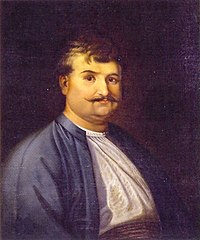Hellenic Nomarchy
[3] This work, an anonymous tract, was published somewhere in Italy in 1806, under the full title: Hellenic Nomarchy: a Discourse on Freedom (Greek: Ελληνική Νομαρχία: 'Ητοι Λόγος περί Ελευθερίας).
[2] The intent of Hellenic Nomarchy was to show that the sole power and authority of the "law" (Greek: Νόμος, romanized: Nomos) could only be established through democracy.
[10] The main references in the book are to the ancient Greek philosophical works, although the influence of contemporary European thinkers such as Jean-Jacques Rousseau, Montesquieu, and Voltaire is obvious in the author's endeavor to describe a "fair and humane" society.
He thus chose only three hundred Spartans and turned the others back.Moreover, Hellenic Nomarchy points to the ongoing successful struggle of the Serbs against the Ottoman rule, which began in 1804.
[13] Hellenic Nomarchy was widely read during the late Ottoman rule among Greeks, and propagated the ideals of freedom, social justice and equality as the main principles of every well-governed society.
[1] However, since its first appearance it remained an enigmatic work, received with discomfort by some contemporaries, shrouded in silence during the 19th and the early 20th centuries, and later causing debate about the identity of the author.
